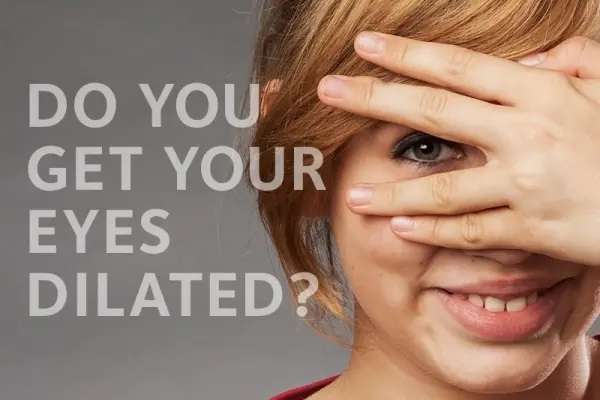IMPORTANCE OF EYE DILATION DURING MY ANNUAL EXAM!

Eye Dilation during an eye exam is done to dilate the eyes and enlarge the pupils. Dilation basically widens the pupil, the black circular part in the center of the eye. Different eyes react a bit differently to the dilation. Sometimes dilation is achieved with just one dose; sometimes it requires repetition of dilation eye drops for proper dilation. It usually takes about 20 to 30 minutes for your eyes to get dilated properly after using the dilated eye drops. Dilation allows more light to come into the eye which gives ophthalmologists a better view for diagnosing the eye.
Your eye doctor can easily examine the entire retina, macula the center part of the retina, and the optic nerve also. It usually takes about 4 to 6 hours for your eyes to get back to normal. Eye dilation helps your eye doctor in viewing the entire retina for diagnosing any eye condition. A yearly eye examination is really important after the age of 40, as more chances of developing eye diseases increase after this age.
Symptoms you might experience during the dilation process –
- Blurry vision
- Eyes become lighter sensitive
- Tightening sensation in the eyelids.
- The problem is focusing on things close to things.
Importance of eye dilation for diagnosing common eye conditions and diseases.
Dilation helps your doctor to do a full inspection of your eyes. It helps to provide a comprehensive examination of the health of your eye. Otherwise, without dilation, it can be tough for the ophthalmologist to examine the eyes properly and detect the eye conditions that are affecting the eyes. Dilation eye drops help the eyes to stay open. It gives your doctor a good look into your eyes. Common eye conditions and diseases can be diagnosed at the earliest stages with the help of dilated eye exam.
Here are some common eye conditions that can be diagnosed with the dilated eye examination –
- Diabetic Retinopathy
- Macular Degeneration
- Glaucoma
- Cataract
- Retinal Detachment
- Age-Related Macular Degeneration
- Infectious diseases
Here are the important factors that determine whether you need eye dilation:
- Age – The chances of getting an eye disease increase with the age. Especially after 60 years of age you should always have dilated eye exam every year. It will be easy for your ophthalmologist to diagnose your eyes properly.
- Ethnic background –Some people with specific ethnic backgrounds such as African-Americans, Black people or Hispanics who are at great risk of glaucoma are suggested to have their eye examination done after the age of 40. Actually, glaucoma is one of the leading causes of many eye conditions and it can even lead to vision loss among the African-American community.
- Medical history – Having a medical history of eye diseases such as Retinal detachment, Macular degeneration increases the chance of having more additional eye diseases. You should never skip the dilated eye exam. For example, if you have already experienced retinal detachment that affects the back of the eye, you may have more chances of getting eye conditions in the future. In that case, you should opt for dilation during an eye examination for a better evaluation of the eye.
- Reasons behind eye evaluation – Specific symptoms may make the dilated eye exam necessary. Otherwise, some simple conditions only require follow-up examination.
- Overall health – The overall health of the person such as diabetes patients is more prone to eye diseases. They also need dilation during the eye exam.
Is dilation necessary for every eye examination?
No, every eye examination doesn’t require dilation. The need for eye dilation depends on the patient’s retinal conditions. For example in some cases, a patient with Glaucoma doesn’t require full eye dilation as it can cause an increase in eye pressure. Let your doctor decide whether you need the dilation during eye examination or not.
What can be expected after the dilation eye exam process?
- Eye dilation can make the eye more sensitive to light, so you should take care of the eyes.
- Initially, after the dilation, it can be difficult to focus on the close-up objects that are why to take some rest before heading back to the work.
- Dilation can make the vision blurry for some time after the eye examination. That is the reason why you should make some arrangements so that your family member or friend can drive you home or help you get home through public transport.
- You can also bring sunglasses to provide a shield for your eyes. The pupils of your eyes are not able to control the amount of light going into your eyes; you need sunglasses to protect your eyes.
Other options than Eye dilation
There are high-tech machines that are available now that can perform retinal eye examination without the need for eye dilation. These machines click photos of the retina in seconds to help the eye examination. However, these machines are still being innovated and expensive.
Conclusion – Comprehensive eye examination requires eye dilation for revealing the status of the optic nerve and retina of the eye. Proper diagnosis of the retina and optic nerve is necessary for preventing and treating various eye conditions. Dilation is a common process during eye examinations; however, if your eyes are healthy and you are young then the doctor can use other methods to analyze your retina. You should always take the suggestions of the doctor on whether you should take the dilation during the eye examination or not.
